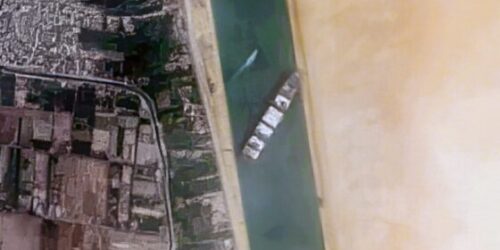EXECUTIVE SUMMARY: The recent blockage of the Suez Canal by the Ever Given tanker demonstrated the vulnerability of maritime chokepoints. The importance of maritime lanes to global trade makes them highly susceptible to interference and sabotage by terrorist organizations and rogue states. Global cooperation is essential to prevent such threats.
The Ever Given, the massive tanker that recently blocked the Suez Canal for a few days, sharply illustrated the vulnerability of international maritime trading routes to disruption, both accidental and deliberate. Several chokepoints along essential maritime routes are ripe targets for terrorist organizations and rogue states.
The Suez Canal allows maritime transportation between Europe (the Mediterranean) and Asia (the Red Sea). The Canal is constructed along 192 km of waterway and is owned by the Suez Canal Authority (SCA) of the Arab Republic of Egypt. The Canal serves as a major shortcut, as it obviates the need to go all the way around Africa to reach the Mediterranean. This shortcut saves cargo-carrying ships at least three or four days of travel.
Just a few days’ delay in the movement of ships through the Canal costs the SCA billions and wreaks havoc on the shipment schedules of companies sending cargo.
While in the case of the Ever Given, the blockage was caused by human error and weather, the incident made apparent the strategic vulnerability of not only the Suez Canal but other maritime chokepoints as well. The Panama Canal, the Strait of Hormuz, the Strait of Malacca, and other chokepoints are vulnerable to actions by state military forces, non-state military groups, pirates, terrorist organizations that are proxies of other states, and independent, non-affiliated terrorists.
This calls for an immediate rethinking of international maritime security cooperation and free maritime trade routes, especially with regard to those critical international maritime transport points that are at greatest risk of attack.
In Asia, the Malacca Strait has long been the most active and important checkpoint for international trade between East and West. Located in Southeast Asia, it is a narrow 930 km passage connecting the Indian and Pacific Oceans. As such, it is vitally important to all the great powers, but no single power has a predominant influence over the Strait.
China has long been eyeing opportunities to gain transport lanes over both land and sea that would remove the necessity to sail south toward the Malacca Strait, but it is coming up against obstacles. Beijing had to endure the failure of the Kra Canal project, a connecting canal in Thailand that would have allowed China to dominate a transport checkpoint. Other options, like a land-based train route, remain of great interest to Beijing, but they would not grant it power comparable to that of the Kra Canal. Another location of strategic value to China is Gwadar Port, at the end of the China-Pakistan Economic Corridor, but it has boundary issues. China wants a transport lane over which it can exert ultimate control, but it is not alone in that pursuit. Geographic chokepoints are strategic “power cards” with appeal to many parties.
The Hormuz and Bab-el-Mandeb Straits are of vital interest to Iran as they are critical to international oil transfer. The Hormuz Strait, which allows maritime passage between the Persian Gulf and the Gulf of Oman leading to the Indian Ocean, is the most important oil transport channel from the Persian Gulf. The Iranian regime controls maritime passage through Hormuz.
Attacks by the Islamic Revolutionary Guard Corps or by its proxies on civilian tankers and military ships in the Gulf of Oman and other parts of the Persian Gulf demonstrate the danger posed by the Iranian regime to the flow of oil and gas from the Persian Gulf as well as the flow of merchandise into the region.
Iranian influence is bolstered further by the Bab-el-Mandeb Strait, which is strategically located beside Yemen. The civil war in Yemen and the resulting vulnerability of the Bab-el-Mandeb Strait pose a threat to maritime lanes leading to the Suez Canal and the port of Eilat. The Houthis can use missiles they received from Iran and North Korea to target tankers sailing close to Yemen in the Red Sea.
Iran uses such attacks to deter the US and Israel from attacking it. By demonstrating the damage it can cause the global economy by attacking ships in the region, Iran hopes to prevent any attack on its interests.
These tactics by Iran increase the vulnerability of tankers and other vessels and pose a threat to the flow of commodities around the world. South Korea and Japan, for example, are dependent on oil and gas from the Persian Gulf. Attacks on oil tankers in the Gulf directly endanger the free flow of oil to those countries, and the resulting rise in insurance costs has a negative effect on the cost of the products.
There is a need for global cooperation to maintain free trade along maritime lanes. Those lanes are vulnerable not only to pirates and missile attacks but also to cyber warfare, which could deliberately create a crisis similar to the Ever Given situation.





